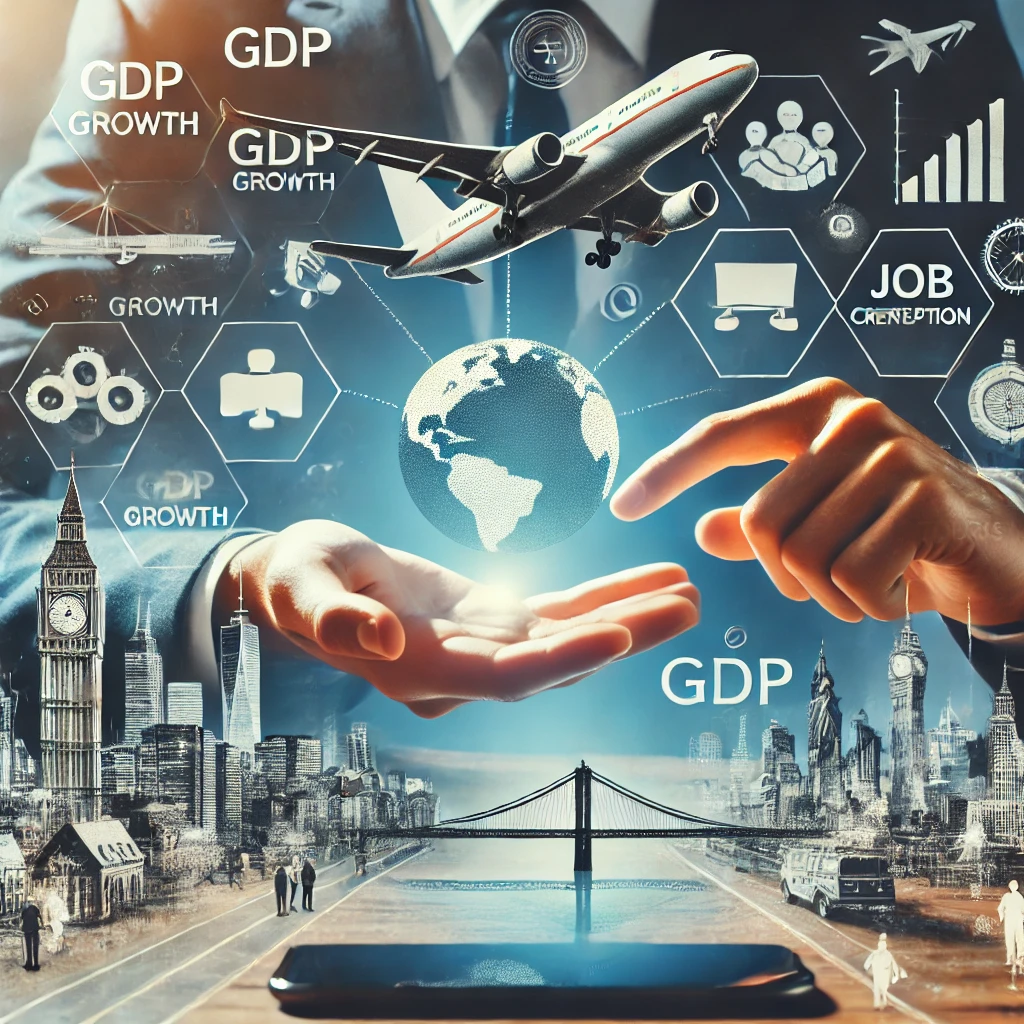Tourism is a significant driver of the global economy, contributing far beyond leisure and vacations. It plays a critical role in job creation, infrastructure development, and economic growth across various sectors. Both developing and developed countries benefit from Economic Impact of Tourism, fostering global cooperation and investment.
In this article, we explore the positive and negative impacts of tourism across several dimensions: economic, sociocultural, environmental, and psychological.
Would you prefer to listen rather than reading ?
What is Tourism?
Tourism is much more than just travel and leisure. It plays a vital role in boosting the economy by increasing tax revenues, promoting personal income growth, and creating jobs across industries such as hospitality, retail, agriculture, and education. According to global estimates, tourism generates income equivalent to 10.4% of the world’s GDP, with one in every ten jobs globally connected to the tourism sector.
In cities like Melbourne, Australia, tourism has proven to be a significant economic contributor, employing over 22,000 people. The economic impact of tourism is felt in various sectors, with investments in infrastructure development including airports, roads, and public spaces benefiting both residents and visitors alike.
The Importance of Tourism and Hospitality
The importance of tourism and hospitality lies in their ability to support local economies and foster cross-cultural understanding. Tourism directly influences the hospitality industry, which includes hotels, restaurants, and attractions. These two industries are interconnected and essential for a country’s economic health.
The relationship between tourism and hospitality is evident as hospitality services cater to tourists, and tourism drives demand for these services. This mutual reliance creates jobs, supports infrastructure development, and contributes to the overall economic impact of tourism.
The Relationship Between Tourism and Hospitality
Understanding the relationship between tourism and hospitality is essential to recognize the synergies that drive both sectors. Tourism relies on hospitality services to provide accommodation, dining, and recreational activities for travelers, while hospitality depends on tourism to fill hotel rooms and restaurants.
The hospitality industry plays a crucial role in making travel experiences enjoyable, which in turn encourages further tourism. This interconnectedness means that the success of one industry significantly boosts the other, promoting overall economic growth.

Economic Impact of Tourism
The economic impact of tourism goes beyond just spending by tourists. It stimulates investment in infrastructure, promotes cultural preservation, and even supports environmental conservation. The tourism industry helps develop new markets and improves activities in tourism that attract more visitors. From accommodations to transportation, tourism has a multiplier effect, impacting various sectors of the economy.
The Multiplier Effect of Tourism
The tourism multiplier effect extends the economic impacts of tourism beyond direct spending. For instance, a hotel booking generates spending on local goods and services like food, transportation, and handicrafts. This interconnectedness boosts local economies and drives innovation.
Moreover, tourism’s ripple effect enhances local economies by stimulating investments in infrastructure, cultural preservation, and environmental conservation. Governments that depend on tourism often invest in developing infrastructure that provides long-term benefits for the local population, from new roads to improved healthcare and education facilities.
Tourism’s Role in Job Creation
Tourism helps in the creation of millions of jobs globally. In 2022, it directly supported 22 million jobs across industries, such as hospitality, transportation, and retail. As the tourism economy grows, it enhances the quality of life for local residents by improving infrastructure and boosting local businesses.
Positive and Negative Impacts of Tourism
Tourism has both positive economic impacts and negative economic impacts. On the positive side, tourism creates jobs, generates income, and improves infrastructure. It can also promote sustainable tourism practices that preserve cultural and natural heritage.
Positive Economic Impacts of Tourism
Tourism drives job creation, infrastructure improvements, and the preservation of cultural sites, all of which enhance local economies. The positive economic impacts of tourism also include promoting local industries, such as food, handicrafts, and transportation.
Negative Economic Impacts of Tourism
However, if not managed properly, tourism can have negative economic impacts such as over-reliance on tourism revenue, environmental degradation, and the displacement of local communities. These impacts of tourism should be carefully considered by governments and organizations to maximize the benefits while mitigating the drawbacks. One significant downside is the over-dependence on tourism as a primary source of income, making local economies vulnerable to seasonal fluctuations and external shocks like pandemics.
Sociocultural Impacts of Tourism
Positive Sociocultural Effects of Tourism
Tourism fosters cultural exchange and mutual understanding between visitors and local residents. Tourists often seek out authentic experiences, from local gastronomy to traditional festivals, helping to promote and preserve cultural heritage. Heritage tourism plays a crucial role in restoring historic sites and promoting local arts, crafts, and traditions. This cultural exchange benefits local businesses by driving demand for unique products and experiences.
The importance of tourism and hospitality is also evident in its role in enhancing community pride. Locals take pride in showcasing their culture, customs, and history to visitors, which strengthens community identity and fosters cultural preservation.
Negative Sociocultural Impacts of Tourism
However, tourism can also lead to the commodification of culture, where traditional customs and practices are modified or commercialized to meet tourist expectations. The demonstration effect can further exacerbate cultural shifts, as locals adopt the consumption patterns and behaviors of wealthier tourists.
This cultural erosion is particularly visible in areas of mass tourism, where the focus on satisfying visitor demands can diminish the authenticity of the local culture. Additionally, tourism can lead to social tensions, with increased crime rates, alcohol abuse, and disturbances caused by overcrowding and excessive noise in tourist hotspots.
What Does Tourism Do for the Economy?
Tourism is often referred to as the soul of all economic activities because it impacts so many sectors. It not only provides jobs and income but also drives infrastructure development, such as roads, airports, and public services. The economic tourism model is vital for developing countries, as it can lead to improvements in education, healthcare, and general living conditions.
The economic impacts of tourism extend to both direct and indirect effects. For example, a tourist may spend money on a hotel room, and that hotel will, in turn, purchase local goods and services. This creates a ripple effect that benefits the entire local economy.
Importance of Tourism Industry and Hospitality
The importance of tourism industry and hospitality industry is evident in their role in creating opportunities for cultural exchange, economic growth, and innovation. The hospitality industry not only provides necessary services to travelers but also acts as an ambassador for the local culture. This is especially true in developing countries, where tourism can bring significant benefits, including job creation and infrastructure improvements.
The economic impact of tourism and hospitality goes beyond just profit margins. It influences everything from government policies to local business strategies, making it a key area of focus for many nations. Promoting responsible tourism is essential for ensuring that tourism remains a sustainable source of economic growth.
How to Maximize the Economic Effects of Tourism and Hospitality
To fully leverage the economic impact of tourism and hospitality, countries need to focus on sustainable tourism practices that ensure long-term growth. By promoting lesser-known destinations, governments can reduce the pressures on overcrowded areas and spread the economic benefits more evenly. Furthermore, investments in infrastructure and tourism development help countries capitalize on their tourism potential, ensuring a robust and resilient tourism economy.
By focusing on sustainable tourism practices and improving the quality of tourism activities, countries can create a more robust tourism economy. It is crucial to promote responsible tourism by educating tourists on how their actions impact the environment and local cultures. Engaging local communities in the planning and management of tourism initiatives also helps create a more inclusive and sustainable tourism model.
Negative Economic Impacts of Tourism
Governments can work with Online Travel Agencies (OTAs) and local businesses to promote lesser-known destinations, ensuring that tourism benefits are spread across all regions. Furthermore, investing in infrastructure and tourism development can help countries capitalize on their tourism potential, driving even greater economic growth.
Positive Environmental Effects of Tourism
In some cases, tourism can drive positive environmental changes. For instance, the re-development of Cardiff Bay transformed an industrial zone into a bustling tourism hub, promoting environmental restoration and creating new recreational areas for locals and visitors alike.
Sustainable tourism initiatives are gaining traction, focusing on eco-friendly practices that preserve natural resources while benefiting local economies. These efforts often include the protection of wildlife habitats, the conservation of natural landscapes, and the promotion of environmentally conscious travel practices.
Negative Environmental Impacts of Tourism
The negative environmental impacts of tourism are far-reaching and often severe. Mass tourism contributes to deforestation, wildlife destruction, and water pollution, all of which can degrade the natural environment. Additionally, air and road travel contribute to global climate change through increased greenhouse gas emissions.
Popular tourist destinations also face issues such as overcrowding and congestion, which can spoil the natural beauty of an area and diminish the overall visitor experience. Erosion, littering, and waste management challenges further strain the environment, requiring strict regulations and responsible tourism practices to mitigate these effects.
Psychological and Health Effects of Tourism
The impact of tourism extends beyond the economy and environment to affect the health and well-being of local populations. In the short term, an influx of tourists can lead to overcrowding, traffic congestion, and higher crime rates, all of which contribute to stress and anxiety among residents. However, positive health effects associated with tourism include improved access to healthcare and increased social interaction, which can enhance the well-being of the local population.
Conclusion
The importance of tourism is clear: it drives global economic growth, supports millions of jobs, and helps to preserve cultural and natural resources. As tourism continues to recover from the challenges of the pandemic, its economic impact will only grow, making it a vital part of the future global economy.
By understanding what tourism is and how it interacts with the hospitality industry, nations and businesses can better harness its potential. Whether by promoting sustainable practices or investing in infrastructure, tourism will continue to be a key driver of economic prosperity worldwide.
As the industry recovers from the pandemic, the economic impact of tourism will grow even further, making it a key driver of global development in the years to come.





